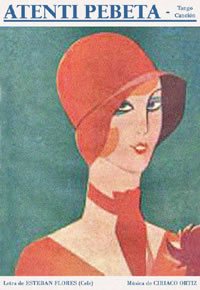Argentine Spanish is strewn with words and colorful phrases from Lunfardo, a rich vocabulary born on the streets of Buenos Aires in the second half of the 19th century. Now considered a fixture of the Spanish language in Argentina (especially in and around Buenos Aires) and Uruguay, linguists cite the use of Lunfardo as a defining characteristic of the Rioplatense dialect. Add a dash of Argentine flavor to your Spanish vocabulary with the Transpanish blog’s ongoing feature highlighting some of the most frequently used terms in Lunfardo.
A popular lunfardo term is junar, a verb that is believed to have derived from the Romani language Caló of Spain and Portugal. In this language, which has inspired many other lunfardo terms, junar means “to listen”. In modern use, though, the meaning has changed.
The first meaning may be described as “to watch” or “look”, although it is more specific than mirar or ver. That is, junar is to look at someone in a roguish or even leering way. Oftentimes, it can be used to describe a person’s excessively obvious/aggressive “romantic” gaze, e.g. Él te está junando “He is leering at you”. Although it refers to a manner of looking in a specific time and space, it can also occasionally have implications beyond the particular instance.
The second meaning is basically synonymous with conocer, which also has a dual meaning—“to meet” or “to know”—though junar more closely compares to the later. It can translate very directly to conocer in an example such as ¿Junás a María?
“Do you know María?” or less so in another, ¿Quién la juna a María?, which is a rather pejorative way to say that nobody knows María, or that she’s not worth knowing.
The third meaning may be considered a sort of extension of the first and second meanings. That is, junar can be used both positivity and negatively with reference to a more essential characteristic or intention of a person—a characteristic beyond what is immediately, physically perceivable (e.g. a person’s manner of looking at). A close common Spanish equivalent here might be a combination of conocer and entender. Although it has a wider range of use than the first meaning, it commonly relates to romantic situations, e.g. La juna por la infidelidad “He/she knows she is unfaithful”.
It’s interesting to consider, first, how junar of lunfardo changed from the original form of “to listen” from Caló, and second, how the contemporary lunfardo meaning severed. At what point did the division between listening and seeing begin to blur, or, was the change less organic, i.e. did the initial rioplantense user of it simply decide to do so in this new manner? Finally, the dual lunfardo meaning raises the question: at what point does a physical characteristic, such as a manner of looking at someone, become more than physical—that is, essential of a person?
The word junar turns up in the lyrics of the tango “Atenti Pebeta” by Ciciarco Ortiz and Celedonio Flores.
Cuando estés en la vereda y te fiche un bacanazo,
vos hacete la chitrula y no te le deschavés;
que no manye que estás lista al primer tiro de lazo
y que por un par de leones bien planchados te perdés.
Cuando vengas para el centro, caminá junando el suelo,
arrastrando los fanguyos y arrimada a la pared,
como si ya no tuvieras ilusiones ni consuelo,
pues, si no, dicen los giles que te han echao a perder.
Si ves unos guantes patito, ¡rajales!;
a un par de polainas, ¡rajales también!
A esos sobretodos con catorce ojales
no les des bolilla, porque 1e perdés;
a esos bigotitos de catorce líneas
que en vez de bigote son un espinel…
¡atenti, pebeta!, seguí mi consejo:
yo soy zorro viejo y te quiero bien.
Abajate la pollera por donde nace el tobillo,dejate crecer el pelo y un buen rodete lucí,
comprate un corsé de fierro con remaches y tornillos
y dale el olivo al polvo, a la crema y al carmín.Tomá leche con vainillas o chocolate con churros,
aunque estés en el momento propiamente del vermut.
Después comprate un bufoso y, cachando al primer turro,
por amores contrariados le hacés perder la salud.









One Response
Dear friends, This blog entry was so enlightening. Thank you. It helped me to better appreciate this line from Gerardo Matos Rodríguez’s poem “La Cumparsita”:
“Fue la primera vez, \ Que al hombre de la pata ´e palo \ Yo le juné un lagrimón.” Poem source: http://hermanotango.com.ar/Poemas/LA%20CUMPARSITA.htm